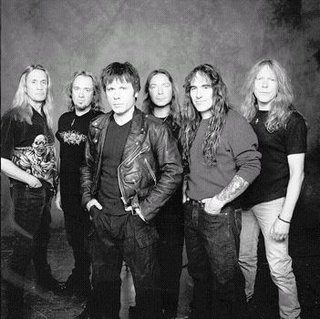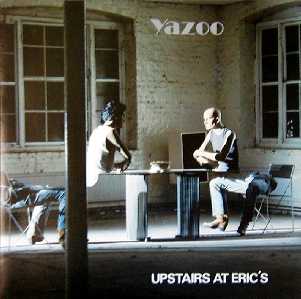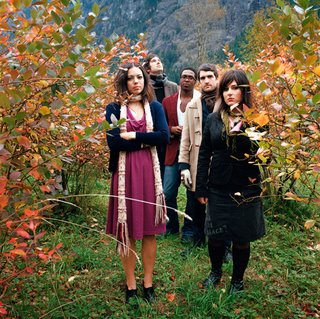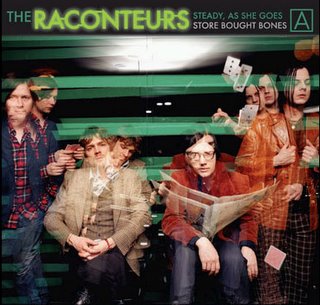With, what, 21 million copies sold, I’m sure that there’s plenty of stories involving
AC/DC’s “Back In Black” and the people who bought it. That’s a lot of records sold, and quite honestly, it amazes me that the album is in the same league as “Thriller” and
The Eagles’ “Greatest Hits Volume One.” So while we wait for the other 20,999,999 owners to tell their own “Back In Black” story, let me tell you mine.
Prior to “Back In Black,” I had been exposed to AC/DC in various record stores and through the fervent support of their fans housed in my hometown. I specifically remember seeing the cover of “If You Want Blood” and being intrigued by the blood and guts imagery. I was also keenly aware that the band seemed to be a bit dirty and that lead singer
Bon Scott had some visible tattoos; back in the day, tattoos were not as socially acceptable as they are now, and that meant that this Bon Scott guy probably grew up on the “wrong” side of the tracks.
The other noticeable thing was that their fans, at least the ones in my hometown, were also from the wrong side of the tracks. For the privileged folk on the North side of town, these individuals were known as “scurves.” To get a visual picture of the stereotype, they all essentially looked like AC/DC rhythm guitarist
Malcolm Young. These are the individuals who saw Bon Scott and, unlike me, could relate to him. Even when said singer was holding up a man with a Gibson guitar jammed into his stomach.

“Highway To Hell” brought the band from the South side to all over town. With an opening riff that’s more effective than a chiropractor visit, AC/DC didn’t really change a thing; they simply kept hitting that brick wall with power chords until the motherfucker fell down.
The “Highway To Hell” single became a favorite at the local pizzeria that most 13 year olds frequented after the Friday night football games. While the girls stuck with the A-side, the rest of us played the flip, “Night Prowler,” when throwing down quarters in the jukebox. We did it for three reasons: 1.) It rocked, 2.) It was over five minutes long, thereby giving us more music for the money and 3.) they did that reference to “Mork & Mindy” at the end of it.
In middle school, I typically sat precariously in between the scurve section and popular section during lunchtime. The popular section was too boring; the scurve section was too scary. In between housed a section of individuals that could easily acclimate to either social stratum. Most of the table consisted of music lovers and we spent the time talking about the albums we liked.
On one day, there was some obvious discontent at the scurve table. One individual had skipped his morning classes and decided to come to school during lunch. He brought with him the news that Bon Scott was dead, and this information was met with a curious display of humanity. A couple of guys vowed to ditch the rest of the day classes, to retreat to the back of a nearby pharmacy and smoke Marlboros. It was a funeral wake that Mr. Scott would be pleased with.
I can’t remember what my reaction was, if any, to the news that AC/DC would continue on with a new lead singer. What I do remember is my first introduction to that album was also my introduction to cocaine.
To be 14 is a strange thing no matter what your locale is. The social cliques start getting defined at this point and, this is crucial, they pave the way for the all-important social network that one has in high school. One needs to align themselves with the “right” people in order to be accepted during the next four years and this alignment sometimes means networking with a variety of different people.
The obvious outlet is through sports, and I tried this approach. On one Friday night, myself and three other guys went to watch the senior high football game. While walking there, one of the guys really had it out for another dude, Sean, who was a notorious stoner and, ironically, was competing against him for the quarterback position on our junior high football squad. For this and some other trivial reason, this guy was going to kick Sean’s ass and the rest of us would be present for moral support. A challenge was given during the football game and about two dozen people made their way across the street to a parking lot to watch the fight. While I was originally in the other guy’s corner, I left the fight as a supporter of Sean. He went into the fight with the same lackadaisical attitude that he had for football; while the other dude swung wildly at Sean’s head, Sean danced back causing the other guy to miss each time. This made Sean grin and he laughed as the aggressor quickly began to wear down. By this time, Sean started to land some accurate jabs, swelling his opponent’s eye, and turning the match into an embarrassment. The scuffle was broken up, and someone yelled that the police were coming. Everyone ran, and I found myself running alongside Sean instead of the guy that I came to the game with. After complementing him on his fighting abilities, we walked to a party his older sister was at.
The party was in an apartment complex, which is an ultra-cool place for a party when you’re 14. What was amazing was that Sean was a year younger than me, and he was obviously much cooler since he had the hookup on parties in apartments. Even more amazing was that the chicks having the party were out of high school. From what I understood, it was Sean’s older sister’s place (he also had another older sister, a year older than me, who lived at home) and after a few moments of debating whether or not she should allow her younger brother and me into her place, she relented and agreed to give us one beer.
Sean determined that she also had some weed and asked her for a joint. She refused and Sean, in a stunning example of clever blackmail, threatened to tell his Mom that she gave him a beer if she didn’t give him a joint. Being older and cooler than us, the plan backfired and she quickly escorted us to the door. “Goodbye boys.” The other girls cooed, as we left, taking the shoe leather express to make sure we made our respected curfews.
“Fucking bitch.” Sean muttered. “That’s ok; I can get some weed from my other sister’s boyfriend. You wanna come over to my house tomorrow and get stoned?” Given the fact that this guy had single-handedly gotten me into a party with 19-year old girls and who, apparently, had a weed connection, the answer was a resounding “Yes.” Sean was decidedly more cool during the two hours that I knew him than most of the other friends that I had for years.
I drove my
moped over to Sean’s house a little bit after lunch the next day. Nobody answered the door, so I went around back and noticed that his room was right off the sliding glass doors to the basement and there, still sleeping in his bed, was Sean. I banged on the sliding glass door and he woke up and let me in.
He told me that when he got home last night, he snuck out and went down the street to party with his sister’s boyfriend, the guy that was supposed to get us some weed. Sean explained that he didn’t have any weed, but he did score some coke from the guy. Having never tried cocaine and in no position to look uncool, I agreed to doing a line. Sean pulled out a new copy of AC/DC’s “Back In Black” album, put the vinyl on the turntable next to his bed, and poured a quarter-gram of cocaine onto the cover of the record jacket. The menacing opening bells served as an appropriate metaphor; I was doing a drug that was extremely “hip” for the time and I was traveling down a road that few fourteen year olds had traveled. AC/DC was the soundtrack to this as Sean laid out lines of the white powder on the stark black record jacket. We did lines throughout side one, and by the time side two hit, we were growing restless.

For whatever reason, Sean decided to snoop around his sister’s room across the hall, possibly to look for hidden cigarettes. He went into her closet and found a shoebox on the top shelf. Inside, we found no cigarettes. Instead, we saw empty wrappers of condoms, a memento to keep track of all of the times she had sex with the guy that gave us the reason to be this restless. Rather than put the box back, he left it on her bed, joking that he was going to leave it for his Mother to find.
He then went upstairs to look for any stray open packs of smokes that his parents may have left behind. “Rock and Roll Ain’t Noise Pollution” started as he slowly marched downstairs, grinning and playing air guitar with two Marlboro 100 cigarettes dangling in his mouth. We went outside to smoke them clandestine under the deck.
I was a novice smoker at this point; actually I was doing it just to uphold my newfound image as “cocaine snorter” and I probably didn’t even inhale.
Suddenly, we heard the front door open and we quickly extinguished the smokes.
A teenage girl yelled “Sean?” from the living room.
“It’s my sister.” He explained.
We heard footsteps coming down the stairs as we remained quietly under the deck outside.
“Sean!” she screamed; she had discovered the shoe box of empty condom wrappers still on her bed.
Sean laughed while his sister violently opened the sliding basement door. She chased him around the house with the complete intention of beating her younger brother senseless. Sean grabbed a handful of rocks as he made his way around the front of the house and proceeded to throw the stones at his sister while calling her a slut. Tired and realizing that she couldn’t catch him, she gave up and retreated back into the house with tears in her eyes.
I hung out with Sean a few more times that year, but at the end of the semester, I had graduated to high school while he had one more year of middle school to go. With the change in schools came another change in the social strata; a blueprint was laid, but as any Freshman will tell you, 9th grade boys don’t rank much on the high school radar.
Sean became the starting quarterback on the junior high football team and, after the season end, continued to test the limits of the school authorities and his parents.
He struggled in school and his low grades even caused him to lose a little luster among his peers. Soon, he too would be considered a scurve-by-proxy, with only his North side address saving him from a life of ridicule and becoming completely discounted. Sean turned into that obligatory stoner, the one that people tolerated but understood that his poor decision making probably ruined any true potential. I later learned that he did end up in the armed forces, possibly a good choice for him, and that he “shaped up,” found a girl to marry, and that he leads a relatively calm middle-class life now.
And 21 million albums later, I’m sure that AC/DC live a relatively calm high-class now. Money provides them with a little more incentive to protect their investment and not take the same risks that they may have when they were hungry. That notion completely sucks, because with each passing year, and with each year they choose not to even release an album, their image gets safer. It’s a double standard for sure, because the older they get, the sillier their double-entendres come across, regardless of how awesome their power chords continue to be.
No matter how silly they seem, they’ll always hold a certain degree of danger for me. There was a time when the band’s fan base were a little dangerous themselves. Think of it this way: many of AC/DC’s line-up also struggled in school, had conflicts with authorities, and appreciated a good party. As they progressed, their repetitive formula managed to sneak into the homes of suburbia who understood the band’s demeanor was part shtick. Thankfully, AC/DC came of age with me and at that time their fans were just as unpredictable as the band. In my mind, they’ll be the band that was the soundtrack for Richard Ramirez, that made albums to do lines of coke off of, and the band who’s fans looked exactly like Malcom Young.
 You can’t take back what you already said, but since this is an electronic medium, I can sure as hell go back and add another album to the 2006 Baker’s Dozen list.
You can’t take back what you already said, but since this is an electronic medium, I can sure as hell go back and add another album to the 2006 Baker’s Dozen list.
















